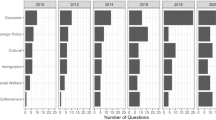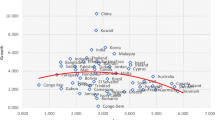Abstract
This paper explores the influence of economic variables in Chilean presidential elections. We use a panel where the dependent variable corresponds to the share of the vote obtained by the incumbent at a municipal level in the presidential elections of 1989, 1993 and 1999. We focus on the unemployment rate and the output gap and find that both have a significant influence on the vote. We also find that if the mayor is from the same coalition as the incumbent, people will further punish the incumbent when regional unemployment is above national unemployment.
Similar content being viewed by others
References
Baltagi, B. (2001). Econometric analysis of panel data (2nd ed). England: John Wiley & Sons.
Centro de Estudios Públicos (2004). Encuesta Nacional de Opinión Pública, Junio-Julio 2004, at http://www.cepchile.cl.
Cerda, R., & Vergara, R. (2005). Government Subsidies and Political Elections: Evidence for Chile. Working Paper No. 294, Universidad Católica de Chile.
Engel, E., & Araos, M.R. (1989). Desempleo, Votación Histórica y el Plebiscito de 1988. Colección de Estudios CIEPLAN No. 27, December, pp. 5–17.
Fair, R.C. (1978). The effect of economic events on votes for president. The Review of Economics and Statistics, LX(2), 159–173.
Fair, R.C. (1996). The econometrics of presidential elections. Journal of Economic Perspectives, 10(3), 89–102.
Kramer, G.H. (1971). Short term fluctuations in U.S. voting behavior, 1896–1964. The American Political Science Review, 65, 131–143.
Ministerio de Hacienda, Chile (2004). Resultados del Comitù Consultivo del PIB Potencial. Santiago, August (at http://www.minhda.cl).
Peltzman, S. (1990). How efficient is the voting market. Journal of Law and Economics, XXXIII, 27–63.
Peltzman, S. (1992). Voters as fiscal conservatives. Quarterly Journal of Economics, CVII(2), 327–361.
Stigler, G. (1973). General economic conditions and national elections. American Economic Review, 63(2), 160–167.
Villena, B. (2003). De quù Dependen los Resultados Electorales en Chile? Un Análisis Empírico de las Elecciones de Diputados de 1993–2001. Unpublished Manuscript, May.
Author information
Authors and Affiliations
Corresponding author
Additional information
JEL classification: C33, E32
Rights and permissions
About this article
Cite this article
Cerda, R., Vergara, R. Business cycle and political election outcomes: Evidence from the Chilean democracy. Public Choice 132, 125–136 (2007). https://doi.org/10.1007/s11127-006-9138-5
Received:
Accepted:
Published:
Issue Date:
DOI: https://doi.org/10.1007/s11127-006-9138-5




